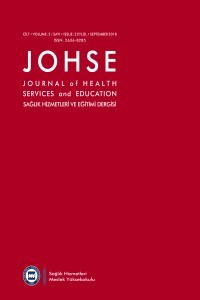COVID-19 Salgını Sonrası Paramedik Öğrencilerinin Mesleğe Bakış Açılarının Belirlenmesi
Amaç: Bu araştırma, COVID-19 salgını sonrası paramedik öğrencilerinin mesleğe bakış açılarını belirlemek amacıyla yapılmıştır. Gereç ve Yöntem: Tanımlayıcı tipte kesitsel bir çalışma olarak planlanan araştırma 01-15 Haziran 2020 tarihleri arasında, 397 paramedik öğrencisi ile tamamlanmıştır. Veri toplama formu olarak 30 ifadeden oluşan “Tanıtıcı Anket Formu” kullanılmıştır. Verilerin analizinde tanımlayıcı istatistiksel yöntemler, t-testi, ANOVA analizleri kullanılmıştır. Bulgular: Bu araştırmaya; yaş ortalaması 20,64±2,07 olan ve çoğunluğu (%64,2) kadınlardan oluşan 397 öğrenci katılmıştır. Öğrencilerin; %53,9’unun salgın haline gelen COVID-19’dan korkmadığı tespit edilmiştir. Araştırmaya katılan bireylerin %74,6’sının acil sağlık hizmetleri biriminin salgın açısından yüksek riskli olduğu, %50,1’inin sağlık kurumlarında çalışanlara yönelik alınan önlemlerin yeterli olmadığı, %69’ ünün alınan önlemlerin çalışanların kaygı düzeyini etkilediği, %47,4’ünün içinde bulunduğumuz salgından dolayı gelecek kaygısı yaşadığı saptanmıştır. Sonuç: Öğrencilerin salgın süresince paramedik mesleğini yapmak istedikleri, çevresindeki insanlara paramedik mesleğini tavsiye edecekleri sonucuna ulaşılmıştır.
Anahtar Kelimeler:
Bakış açısı, COVID-19, meslek, paramedik, öğrenci
Determination of Paramedic Students' Perspectives on the Profession after the COVID-19 Outbreak
Aim: This research was conducted to determine the perspective of paramedic students towards the profession after the outbreak of COVID-19. Materials and Methods: The study, which was planned as a descriptive cross-sectional study, was completed between 01-15 June 2020 with 397 paramedic students. "Introductory Questionnaire Form" consisting of 30 statements was used as the data collection form. Descriptive statistical methods, t-test, ANOVA analysis were used in the analysis of the data. Results: 397 students, mostly women (64.2%), with a meanage of 20.64±2.07, participated in this study. Of the individuals participating in the study, 74.6% of the emergency health services unit is at high risk in terms of outbreak, 50.1% of the measures taken against employees in health institutions are not sufficient, 69% of the measures taken affect the anxiety level of the employees, 47.4% ' It has been determined that the reputation is anxious for the future due to the outbreak we are in. Conclusion: It was concluded that the students wanted to do the paramedic profession during the epidemic and would recommend the paramedic profession to the people around them.
Keywords:
COVID-19, job, paramedic, perspective, student,
___
- Gençalp DK. COVID- 19 salgını döneminde ilk ve acil yardım öğrencilerinin beslenme alışkanlıkları ve fiziksel aktivite durumlarının değerlendirilmesi. Paramedik ve Acil Sağlık Hizmetleri Dergisi. 2020; 1(1): 1–15.
- Gündüz T, Arserim SK, Lİimoncu ME, Balcı Ö. İlk ve acil yardım teknikerliğinde eğitimin değerlendirilmesi. Hastane Öncesi Dergisi. 2018;3(2):121–9.
- Göllüce A, Avan H, Karsu F. Öğrenci gözüyle paramedik mesleği. Hastane Öncesi Dergisi. 2017;2(1):1–9.
- Demirağ H, Hintistan S. İlk ve acil yardım programı öğrencilerinin yaz stajı hakkındaki görüşlerinin incelenmesi. Ordu Üniversitesi Hemşirelik Çalışmaları Dergisi. 2019; (1): 46–55.
- Chang L, Yan Y, Wang L. Coronavirus Disease 2019: Coronaviruses and Blood Safety. Transfus Med Rev. 2020; 34(2): 75–80.
- Liu S, Yang L, Zhang C, Xiang YT, Liu Z, Hu S, et al. Online mental health services in China during the COVID-19 outbreak. The Lancet Psychiatry. 2020; 7(4): 17–18.
- Adams JG, Walls RM. Supporting the Health Care Workforce during the COVID-19 Global Epidemic. JAMA - J Am Med Assoc. 2020; 323(15): 1439–1440.
- Duan L, Zhu G. Psychological interventions for people affected by the COVID-19 epidemic. The Lancet Psychiatry. 2020; 7(4): 300–302.
- Ergün E, Ergün Ş, Çelebİ İ. Acil sağlık hizmetleri personellerinin Covid- 19 hakkında bilgi, korunma düzeyleri ve etkileyen etmenler. Paramedik ve Acil Sağlık Hizmetleri Dergisi. 2020; 1(1): 16–27.
- Sayed M El, Kue R, McNeil C, Dyer KS. A descriptive analysis of occupational health exposures in an urban emergency medical services system: 20072009. Prehospital Emerg Care. 2011; 15(4): 506–510.
- Kim OS, Oh JH, Lee kyung H. The convergence study on anxiety, knowledge, infection possibility, preventive possibility and preventive behavior level of MERS in nursing students. J Korea Converg Soc. 2016; 7(3): 59–69.
- Perkins A, Kelly S, Dumbleton H, Whitfield S. Pandemic pupils: COVID-19 and the impact on student paramedics. Australas J Paramed. 2020; 17: 1–4.
- Soysal F, İşler SÇ, Peker İ, Akca G, Özmeriç N, Ünsal B. COVID-19 Pandemisinin Diş Hekimliği Uygulamalarına Etkisi. Klimik Dergisi. 2020; 33(1): 5–14.
- Cetintepe SP, İlhan MN. COVİD-19 salgınında sağlık çalışanlarında risk azaltılması. J Biotechnol Strateg Heal Res. 2020; 1(Özel Sayı): 50-54
- Baltacı NN, Çoşar B. COVID-19 pandemisi ve ruh beden ilişkisi. Türkiye Klin. 2020; 1(Özel sayı): 1–6.
- Wu P, Fang Y, Guan Z, Fan B, Kong J, Yao Z, Liu X, Fuller CJ, Susser E, Lu J, Hoven CW. The psychological impact of the SARS epidemic on hospital employees in China: Exposure, risk perception, and altruistic acceptance of risk. Can J Psychiatry. 2009; 54(5): 302–11.
- Röhr S, Müller F, Jung F, Apfelbacher C, Seidler A, Riedel-Heller SG. Psychosocial Impact of Quarantine Measures During Serious Coronavirus Outbreaks: A Rapid Review. Psychiat Prax. 2020; 47: 179–89.
- Brooks SK, Webster RK, Smith LE, Woodland L, Wessely S, Greenberg N, Rubin GC. The psychological impact of quarantine and how to reduce it: rapid review of the evidence. Lancet. 2020; 395(10227): 912–20.
- Chong MY, Wang WC, Hsieh WC, Lee CY, Chiu NM, Yeh WC, Huang TL, Wen JK, Chen CL. Psychological impact of severe acute respiratory syndrome on health workers in a tertiary hospital. Br J Psychiatry. 2004; 185: 127–133.
- Başlangıç: 2017
- Yayıncı: Marmara Üniversitesi
Sayıdaki Diğer Makaleler
Ülke Örnekleri İle Evde Bakım Hizmetlerine Genel Bakış
COVID-19 Salgını Sonrası Paramedik Öğrencilerinin Mesleğe Bakış Açılarının Belirlenmesi
Serap GÜNGÖR, Hakan AVAN, Vedat ARGIN
Çocukları Sokağa İten Faktörler, Karşılaştıkları Sorunlar ve Hemşirenin Rolü
